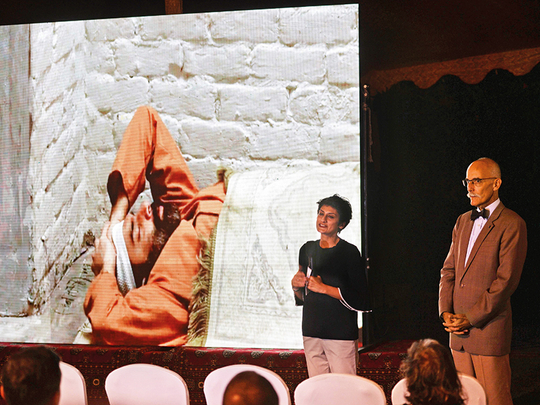
ISLAMABAD: How does a condemned person feel in the 24 hours before execution? In Pakistan, one of the world’s top executioners, an unprecedented artistic performance lays bare what happens when a life is ended behind prison walls.
The project, dubbed “No Time to Sleep”, saw actor Sarmad Khoosat embody “Prisoner Z”, locked in isolation for his last hours in this world, in a live-streamed 24-hour performance which ended at the stroke of midnight Wednesday.
His story is inspired by a real case, that of an inmate named Zulfiqar Ali Khan, who spent 17 years on death row before being executed in 2015.
The project was launched by the Justice Project Pakistan (JPP), an organisation which seeks to defend the most vulnerable prisoners.
Its goal is to show “the sheer humanity of how, what a person goes through ... what it actually takes up front and close when the state decides to take a human life,” said Sarah Belal, JPP director and the lawyer for Zulfiqar Ali Khan.
As the performance began at 12.00am on Wednesday, Z sat in his cell, faithfully reconstructed in a Lahore studio, and awaited his final hour.
Cameras broadcast his movements in real time on Dawn newspaper’s website.
Through them, Pakistanis watched Z talking to his guard, reading the Quran, and receiving the last, heartbreaking visit from his family.
“We give permission for the state to execute in our name, so if we’re going to do that it’s our duty as citizens to be educated about how it’s actually done,” Belal said.
Executions generally take place “in the dark of night behind prisons ... so it’s really removed from the society that’s taken that decision”.
The performance, unprecedented in Pakistan, was shown in universities and captivated social media, becoming a top trend in Pakistan and spurring widespread debate.
Many described watching the “jaw-dropping” performance for hours.
“It took me some time to recover from #notimetosleep — & I still don’t have the right words to express the impact this screening has had. I’ve never felt more confident in my choice to be against the death penalty,” said one viewer, Daanika Kamal.
Others criticised JPP for focusing on the experiences of the condemned man.
“Do you understand the destruction and devastation, a murder causes to the victim and the family and heirs of the victim? Or is your sympathy for the criminal alone?” tweeted Esmael Malek.
‘Death is no deterrent’
Excluding China, which classifies its executions as a state secret, Amnesty International says Iran, Saudi Arabia, Iraq and Pakistan — in that order — carried out 84 per cent of all executions in 2017.
Since 2004, 4,500 people have been sentenced to death in Pakistan, almost one per day, according to statistics gathered by JPP — and that time period includes a six-year moratorium on executions.
The moratorium was controversially lifted shortly after a bloody attack on a school in Peshawar in 2014.
Since then, according to JPP, Pakistan has hanged 496 people, among them some of the school attackers.
But the executions were carried out behind closed doors to the anger of grieving parents, who demanded the hangings be public — a grim demonstration of support for the death penalty in a traumatised country which has lost so much to militant violence.
The list of crimes punishable by death in Pakistan is long — taking in 33 offences including blasphemy, extramarital sex, drug trafficking, and, oddly enough, “sabotage of the railroad”.
“(The) death penalty is usually presented as a means to try to curtail crimes, but we know that it does not work,” said Jean-Francois Cautain, ambassador of the European Union in Pakistan.
He regularly discusses the issue with Pakistani authorities, he said, trying to convince them that more violence will not help victims.
Belal said there was “a lot of hope” after the performance. “We definitely feel public opinion shifting.”
But it has been hard to watch, she added. Zulfiqar Ali Khan was her first death penalty client.
“I’m reliving the memory of this prisoner that changed the course of my life.”












